Employee morale is like Bigfoot; elusive, somewhat undefined, and not always visible. But employee morale impacts a large percentage of your workforce, whether you want to acknowledge its existence or not. If you want your organization to be running at peak performance, chasing productivity like Bigfoot enthusiasts chase after their mythological creature, you need to understand what employee morale is and what factors could affect employee morale in your organization.
That's where this blog comes into play. This blog aims to explore various strategies and insights on how to boost morale in your organization.
In this blog, you will find:
📈 Why Is Boosting Employee Morale Important?
🏆 Enhancing Market Competitiveness
🧩 5 Factors Affecting Employee Morale
🧠 5 Effective Strategies to Boost Employee Morale
Morale Definition
Understanding 'Morale' is essential in any group or organizational context. Morale refers to the collective attitude, overall satisfaction, and emotional outlook of a group, be it a team, community, or an entire organization. It includes factors such as collective spirit, enthusiasm, and the level of dedication members feel towards their group's goals or objectives. High morale in any group is usually marked by optimism, a strong sense of purpose, and a positive environment. In contrast, low morale can result in disengagement and lower effectiveness. Recognizing and enhancing morale is key to fostering a productive and harmonious environment, whether in sports, community projects, or business teams.
What is Employee Morale?
Employee morale is specifically concerned with the morale within a workplace. It is defined as the overall satisfaction, attitude, and outlook of employees during their tenure with an organization.
This concept plays a crucial role in various aspects of business dynamics, including workplace culture, employee engagement, and the overall employee experience. High employee morale is typically characterized by job satisfaction, strong team cohesion, and a positive attitude towards the organization and its objectives. Conversely, low employee morale can lead to reduced workplace productivity and higher employee turnover.
Understanding and improving employee morale is thus a strategic imperative for leaders aiming to achieve optimal organizational performance and employee well-being.

Why Is Boosting Employee Morale Important?
Understanding why and how to boost morale in the workplace is vital for any successful business strategy. Employee morale is directly correlated to your organization’s overall productivity, competitiveness in the market, and, in turn, your profitability. Understanding and improving employee morale is not just an aspect of good leadership; it's a strategic initiative that can lead to significant business gains.
In the following sections, we're going to dive deeper into how boosting morale can enhance productivity, elevate competitiveness, and ultimately drive profitability.
Morale and Productivity
While employee morale impacts individual productivity, team morale is equally crucial as it boosts morale and enhances collaboration and efficiency in team projects and goals.
Employees with a higher level of employee morale tend to be more productive, more satisfied with their jobs, and more engaged at work. This can give you a significant advantage because happy and fulfilled people at work tend to stay in place (low employee turnover), tend to go to bat for your brand (employee-led brand recognition), and tend to boost customer satisfaction ratings.
Enhancing Market Competitiveness
Morale also plays a crucial role in boosting an organization's market competitiveness. When employees are satisfied, it positively impacts their performance, which can set a company apart from its competitors. Similarly, improved customer service naturally follows high morale, contributing to a strong market reputation.
The Profitability Factor
Lastly, employee morale and profitability are directly linked. High morale can lead to lower turnover rates, which in turn reduces costs associated with hiring and training new employees. Simultaneously, increased productivity and better customer service can drive higher sales, directly impacting the bottom line.
5 Factors Affecting Employee Morale
So, what factors affect employee morale? Because employee morale is something that people feel – both individually and collectively – here are 5 factors that can influence it:
1. Leadership
Effective leadership doesn't just shape the work environment; it's a key component to boost employee morale and elevating team morale by fostering a sense of unity and purpose among team members.
An employee with an inspiring leader who leads with transparency and authenticity and encourages them to do their best work provides constructive feedback that allows the employee to grow and succeed and models the type of positive behaviors that they want to see from that employee is far more likely to feel empowered and valued.
On the other hand, an employee with a leader who shows a lack of trust in that employee, micro-managing tendencies, or failing to provide adequate feedback can lead to the employee feeling disengaged, devalued, and unmotivated.
2. Communication
Effective two-way communication is vital for maintaining morale. Employees feel empowered when their voices are heard and acknowledged.
Maintaining employee morale relies heavily on your organization’s communication style. Efficient and effective two-way communication – not only from C-level to employees! – is key in boosting employee morale. In fact, according to Forbes, employees who feel like their voice is being heard are almost 5 times more likely to feel empowered to perform their best work – the article goes so far as to say that employees expect communications to be a two-way street!
3. Reward & Recognition
Recognition can make employees feel more connected, engaged, and productive. It makes them feel valued and eager to continue performing well.
Do your employees feel that they are being recognized for the work they’re doing? How often do you recognize employees who go above and beyond? Employee recognition makes employees feel more connected to their work, more engaged, and more productive. By acknowledging and celebrating their achievements, your employees will feel more valued and, in turn, more eager to repeat the behavior. Regular recognition programs are an effective strategy to boost morale, making employees feel valued and appreciated.
When it comes to rewards, they don’t necessarily have to be elaborate or expensive. Small gestures can also go a long way. In fact, a study by Reward Gateway says that 75% of employees said their motivation and morale would improve if their managers just thanked them more often.
4. Work-Life Integration
Encouraging a healthy balance between work and home life is another crucial part of boosting employee morale. Recognition can make employees feel more connected, engaged, and productive. It makes them feel valued and eager to continue performing well. Employees who feel like their work is negatively impacting their personal lives quickly become despondent, dissatisfied, and disengaged with their work.
Despite this, many organizations fail to recognize just how important it is that employees have proper work-life integration. The COVID-19 pandemic put many employees’ work and home lives on a direct collision course when they were asked to work from home – as this Global news article says, work-from-home directives have blurred the distinction between on- and off-hours. Employee burnout (“chronic workplace stress that has not been successfully managed”) is very real.
On the other hand, when you’re able to acknowledge that your employees are people with lives that are outside of your organization, and you actively seek to help them find a good balance between their work and home life, you show that you not only understand the difference between the two but that you understand the boundaries between them, as well. When employees know that you have their best interests at heart, it increases employee morale, making them more invested in your company and, in turn, increasing their productivity and effectiveness. 
5. The Nature of Work In Relation to Your Organization
The kind of work employees do impacts their morale. Organizations must understand how the nature of work influences employee morale and strive to make even mundane tasks satisfying.
The work that your employees do every single day is the soul of your organization. No matter your industry or size, this work is the lifeblood of who you are as a company and, regardless of the employee’s role, is how your organization collects revenue.
The work that the employee performs has a direct correlation to their level of employee morale. Employees want to feel challenged by their work without additional stress being put on them. Unfortunately, the nature of the beast is such that sometimes employees need to perform work that they don’t find fulfilling – dull or repetitive tasks, for instance. An organization that understands how the nature of work impacts employee morale will be able to turn even these monotonous tasks into more satisfying and rewarding work for employees.
5 Effective Strategies To Boost Employee Morale:
Now that we’ve gone over some of the more important factors of employee morale, it’s time to look at how organizations like yours can boost it! Here are 5 effective strategies that can help boost employee morale in your organization:
1. Monitor Your Employee Morale
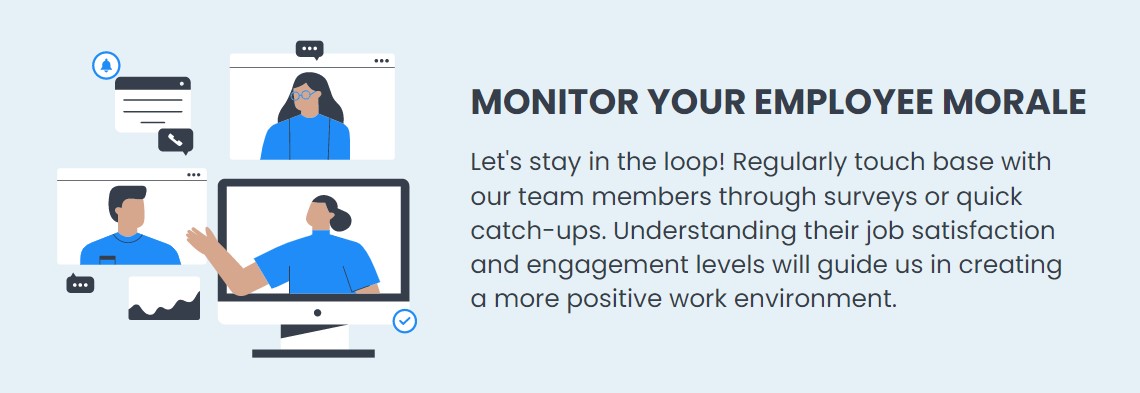
Regularly check in with your employees to understand their job satisfaction and engagement levels.
Do you ask your employees how they feel about their jobs? Do you have a safe (and, when necessary, anonymous) way for employees to provide their feedback to not only their managers but the leadership team as well? Monitoring employee morale can be as simple as conducting an annual employee survey to gauge employee engagement, employee job satisfaction, and more.
Employee experience surveys, for example, can help you show your employees that you want to hear from them. Strategically monitoring employee morale can help you to improve employee morale and engagement, which, in turn, helps you to build your corporate culture.
2. Improve Internal Communication
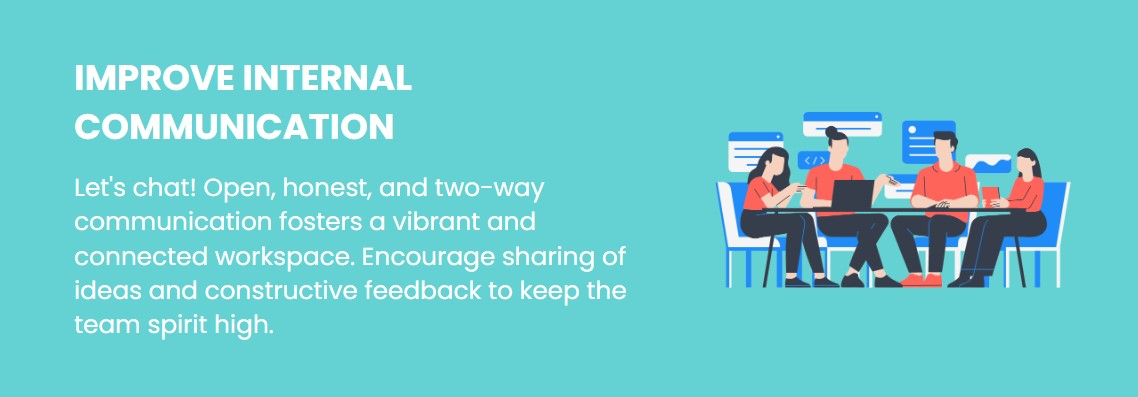
Effective internal communication keeps employees engaged and boosts morale.
There’s no question that the pandemic has changed many things about how organizations like yours communicate internally. Internal communication has been highlighted as an essential way to keep employees engaged and, as we know from above, is an essential component of employee morale.
Internal communications platforms (also known as Employee Experience Platforms or EXPs) like Workvivo, Blink, and Simpplr can help you open the lines of two-way communication within your organization. EXPs allow you to focus on real-time, instant communication on a platform that is familiar to all employees. With many of these platforms, you can create posts, polls, live videos, and more in mere minutes and receive feedback from employees at the click of a “like.”
3. Celebrate Your Employees’ Accomplishments
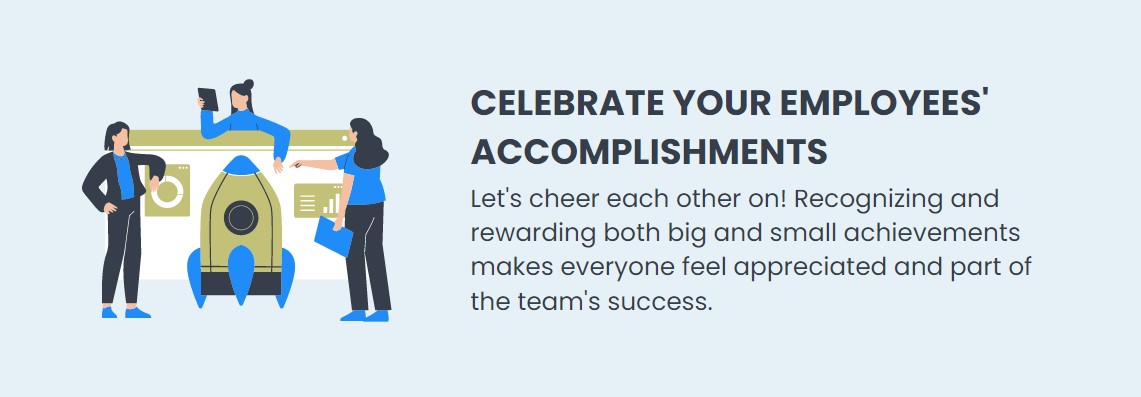
Celebrating team accomplishments is a powerful way to boost team morale, encouraging members to work collaboratively towards shared objectives.
Has your marketing team just completed a 3-month, in-depth overhaul of your website? Did your sales team just reach $5 million in sales in one year? Did your newest customer service representative receive positive feedback on a customer survey? Did one of your employees complete a continuing education certificate?
Whether the win is big or small, recognizing both individual employees’ accomplishments and team wins is a key component of boosting employee morale. By celebrating these wins, not only are you giving that employee a sign of approval for their hard work, but you also recognize their contribution to the organization overall. This can lead to a renewed sense of purpose for that employee, which can make them more enthusiastic to take on similar challenges or projects.
You can use an internal communications platform to recognize employees’ achievements and accomplishments. For example, groups within these platforms can be used to promote employee recognition by providing a space where managers and leaders can post about an employee's successes, highlight their great work, or call out a team or department for their contribution to the organization. Tagging allows the individual to know when they’ve been recognized and view the post. Colleagues can also engage with the post by liking or commenting, offering encouragement and positive feedback to boost the individual's self-esteem.

4. Prioritize Employee Mental Health & Wellness
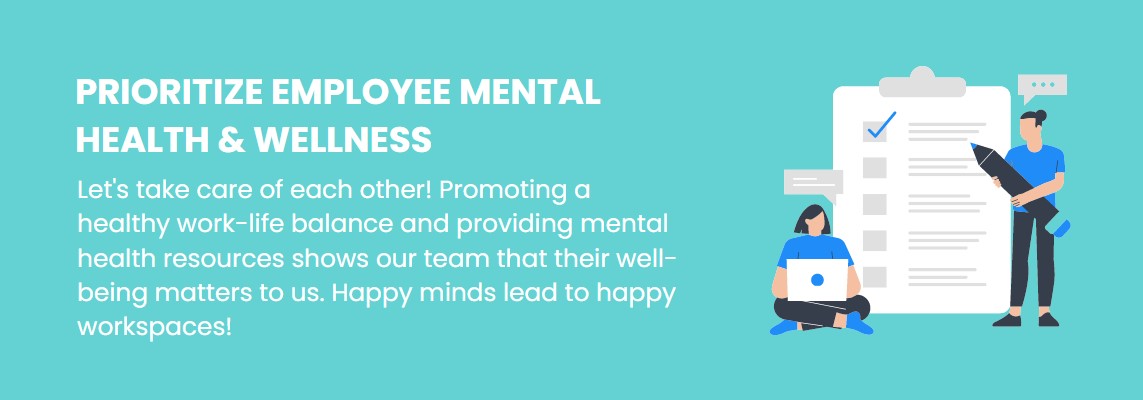
Promote work-life balance and other wellness initiatives. This shows employees that their well-being matters, improving morale and retention rates.
Prioritizing employee mental health and wellness is another tip to boost employee morale. When employees are aware that the organization they work for values their well-being, employee retention rates skyrocket, and your organization ranks highly for prospective employees, as well.
Providing employees with tools that aid in work-life integration, like Employee Experience Platforms (EXPs), is just one way to show that you prioritize employee mental health and wellness. But it’s not the only way to do so! Implementing things like meeting-free days, encouraging teams to take their lunch breaks together, or setting a standard for finishing work at a reasonable hour are all ways to promote employee mental health and wellness within your organization.
One of the ways that LineZero helped customers throughout the pandemic was by developing a Coffee Bot. This bot would arrange random half-hour meetings between members of the organization. Anyone in the organization – from C-Level down to frontline workers – who were enrolled in Coffee Bot would be sent weekly promptings asking if they were available during a specific time. If they answered “yes,” Coffee Bot would match them with others who were free and send a calendar invitation for the date and time to meet.
5. Make Time For Building A More Connected Team
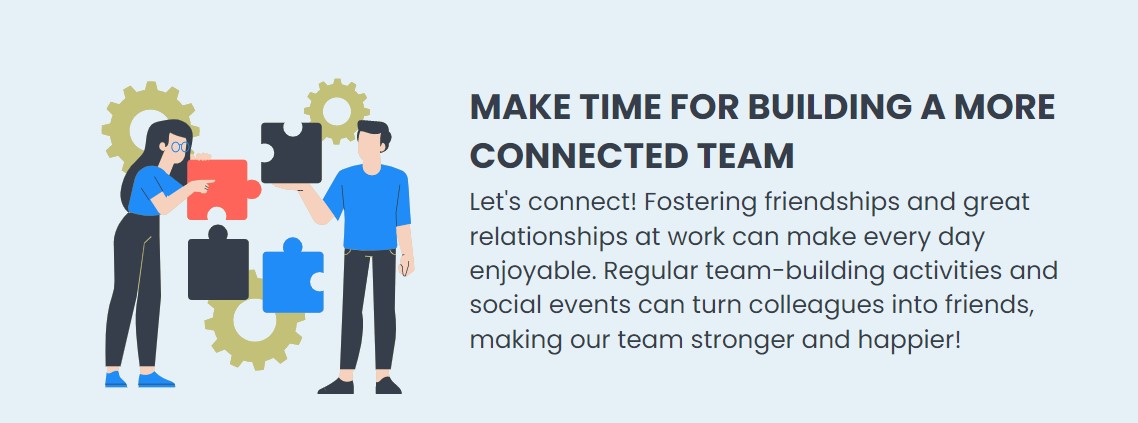
Foster friendships at work to enhance performance and make employees look forward to work. Friendships are important for your employees – according to an article by Business News Daily, 36% of employees say they look forward to going to work when they work with a friend, and 31% of employees feel stronger and more valued.
As an organization, therefore, it’s important to set aside time to build a more connected team. Things like encouraging virtual or in-person social events and providing a platform where employees can share hobbies, personal experiences, and stories, and more are ways an organization can demonstrate a commitment to building a more connected team.
LineZero, for example, has created several employee-led and employee-managed Groups on various topics like Foodies; Sports & Fitness Fiends; Pet Lovers; Family; Women; Diversity, Equity, Inclusion, & Belonging; Travel Buddies; and more. These groups help employees to connect over various hobbies and interests and help employees – especially those in other geographic locations – to meet and develop friendships with like-minded individuals.
Conclusion
Cultivating a positive and encouraging work environment is not just a 'nice-to-have' but a strategic imperative in today's competitive business landscape. When employees feel valued, connected, and engaged the entire organization benefits. Higher morale leads to increased productivity, stronger commitment, and better results for your bottom line.
Adopting EX platforms can play a crucial role in achieving these goals by opening up lines of communication, encouraging collaboration, and fostering a sense of community.
We hope these insights and strategies inspire you to take action and put employee morale at the forefront of your business strategy. After all, your people are your greatest asset. Start nurturing this asset today and see the transformational impact on your organization.
Do You Want To Create A More Connected & Positive Workplace Culture?
LineZero's digital employee experience consultants can help you achieve this!
We work with top Employee Experience Platforms (EXPs) like Workvivo, Simpplr, and Blink. We are here to help you evaluate, implement, and optimize solutions that connect, engage, and inspire your team.
Enhance your employee experience today — book a call now!

October 12, 2023
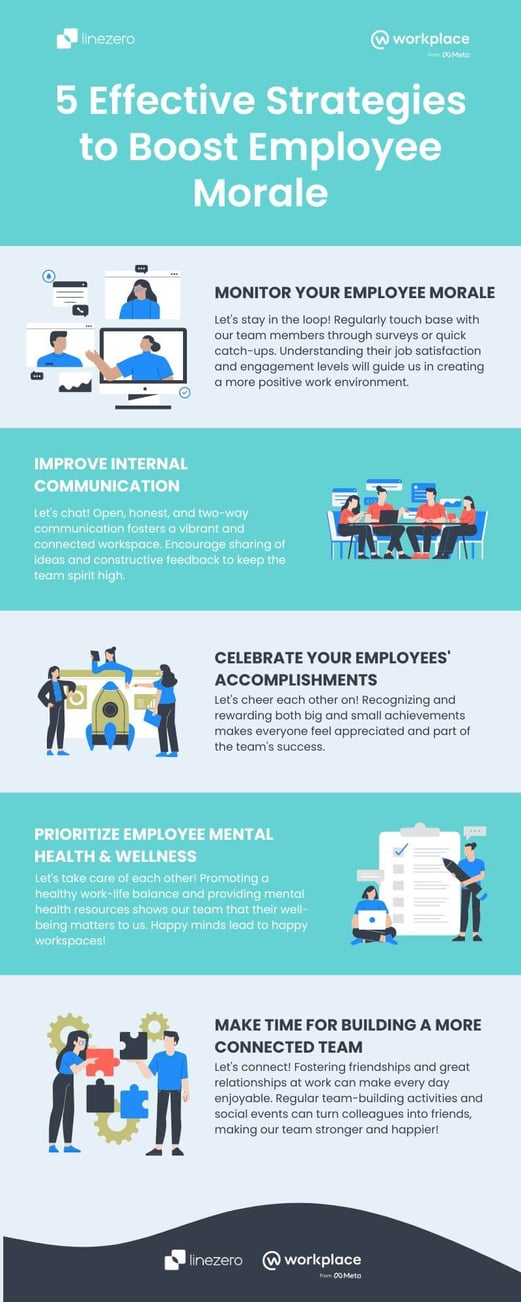



.png?width=520&height=294&name=LINEZERO%20BLOG%20COVERS%20(2).png)
Comments